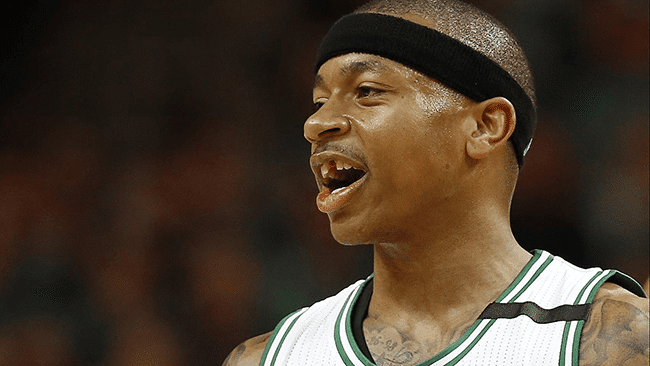
Sports build camaraderie. They’re fun, adding some excitement to an otherwise mundane week, and they’re always a great source for exercise. But of course, all good things have to have some kind of drawback, right? If you thought this, you’d be correct. And with sports, you have to balance your fun with the risk of injury—and that includes mouth injuries.
As the NBA Finals start up, you don’t have to think too far back for a dramatic example. During the playoffs, Boston Celtics point guard Isaiah Thomas was going for the ball when an opposing player hit him in the mouth with his elbow. He was not wearing a mouthguard, so needless to say, Isaiah lost his front tooth and needed hours of oral surgery to repair the damage.
We can’t say for certain what would have happened if Isaiah were wearing a mouthguard, in many cases, basic safety precautions can prevent, or lessen the impact, of incidents like this one. The American Dental Association reports that athletes are 60 times more likely to suffer mouth injury when not wearing a mouthguard. That’s a lot of trips to the dentist saved by wearing a mouthguard!
So if you want to enjoy sports and make sure you don’t end up with a missing or chipped tooth, here’s some advice. If you play in a contact sport, or if there is any chance for a body part or object to hit your mouth, wear a mouthguard.
There are three types of mouthguards: Stock, boil and bite, and custom fitted.
Stock Mouthguard
The cheapest of the mouthguards, these offer some protection, but not as much as the others. Since they’re “one size fits all,” these mouthguards can often be uncomfortable.
Boil and Bite Mouthguard
Similar to stock mouthguards, you can buy these at sporting goods stores or places like Walmart. To get a better fit, you boil these mouthguards to soften the plastic. When the temperature of the mouthguard is safe, you place it in your mouth and bite down, allowing the mouthguard to shape to your mouth. A better-formed mouthguard provides more protection and makes for a comfortable fit as well.
Custom Mouthguard
Your dentist can create a mold of your teeth to create a mouthguard made specifically for your mouth. These mouthguards provide the best protection, and are the most comfortable; many people will forget they are even wearing them.
Athletic Mouthguard: Sports Dentistry
An athletic mouthguard helps protect your teeth, jaw, and supporting gum tissue from injury while participating in collision and/or contact sports. Participation in sports has steadily increased. Several sources estimate that between 20 to 25 million kids participate in sports annually.
Competition among players and teams has intensified in recent years which has contributed to an increase in the number of sport related injuries that impact your face and smile.
- National Youth sports Foundation for Safety reports show dental injuries are the most common type of injury sustained while participating in their chosen sport.
- According to the American Dental Association, approximately 10-20% of all sport related injuries are maxillofacial (injury of the face, jaw, and/or teeth).
An athlete is 60 times more likely to sustain damage to their teeth when they’re not wearing a protective mouthguard while on the field of play (Source: Nationwide Children’s Hospital). In an effort to help get the word out and increase the awareness about the importance of wearing mouthguards, April has been designated as National Face Protection Month.
National Face Protection Awareness Month
Every year in April, just prior to the start of many sport seasons begin, five oral health organizations rally together and advocate for team coaches and organizations to strongly recommend that athletes to wear an athletic mouthguard while participating in collision and/or contact sports. These organizations include:
- Academy for Sports Dentistry
- American Academy of Pediatric Dentistry
- American Association of Oral & Maxillofacial Surgeons
- American Association of Orthodontics
- American Dental Association
The above five health organizations collaborated to publish a news press release in April 2016 titled Double Down on Mouthguards in recognition of National Face Protection Month. It’s a good, quick read highlighting many of the risks associated with preventable injuries.
These organizations track and report sport injuries and have found the sports listed below have the highest incidence of dental trauma:

An Athletic Mouthguard Helps Prevent Traumatic Dental Injuries
The National Youth Sports Foundation for Safety estimates the cost of reimplanting a tooth, including follow-up dental treatment, is roughly $5000.00, or the equivalent of fabricating 83 custom-fitted athletic mouthguards from your dentist. This doesn’t even account for the pain and embarrassment you or your child may suffer from broken teeth.
The following list includes the most commonly reported sport-related traumatic dental injuries.
- Tooth fracture
- Avulsion (Tooth knocked out)
- Tooth displacement (Tooth pushed back or forward)
- Injury to TMJ (Tempromandibular Joint)
- Injury to soft tissues
- Protects dental brackets and wires
- Protects your teeth, lips, cheeks, jaw, and supporting gum tissue from direct and indirect impact
- Helps prevent head concussions
Keep in mind that all of those injuries can be avoided by choosing to wear an athletic mouthguard. So why don’t people wear a mouthguard to protect their teeth?
Common Athletic Mouthguard Objections
Many of the most common objections to wearing a mouthguard can be resolved with a custom-fitted mouthguard from your dentist.
- Uncomfortable
- Fit is loose and not retentive
- Difficult to talk
- Impairs understanding of speech with a mouthguard in place
- Cumbersome
- Bulky
- Inconvenient
- Smelly
- Tastes bad
- Falls out accidentally while on the field of play
- Afraid to wear accidentally wear a teammate’s mouthguard
The bottom line is this: if you don’t wear your mouthguard, then it’s not protecting your teeth.
There are multiple reasons why people don’t wear their mouthguards. A lot of store-bought mouthguards make it hard to breathe, talk, and drink, or just aren’t comfortable. In many cases, coaches (and parents) don’t enforce the wearing of mouthguards.
If you’re going to play sports, and you want to protect your teeth, you need to wear a mouthguard. While a custom mouthguard may cost more money, their wearability means people are more likely to use them. And compared to the pain, time, and cost of surgery for fixing a mouth injury, even the most expensive custom mouthguard is inexpensive.




